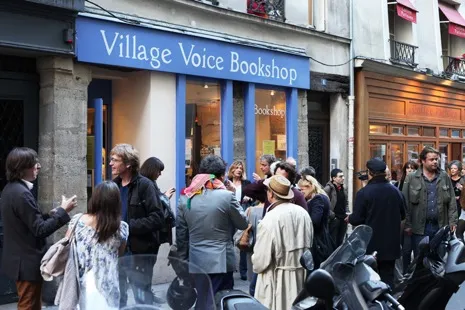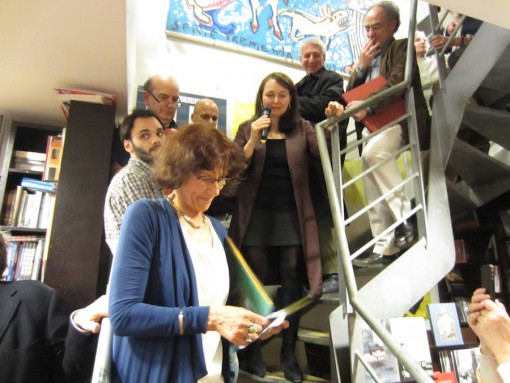 oday we have a guest blogger, The New Yorker, of all “people.” Last week we talked of authors and bookshops. And if you think of a bookshop in Paris your thoughts must turn to the illustrious Village Voice on the rue Princess, which alas, is no more.
oday we have a guest blogger, The New Yorker, of all “people.” Last week we talked of authors and bookshops. And if you think of a bookshop in Paris your thoughts must turn to the illustrious Village Voice on the rue Princess, which alas, is no more.
FAREWELL
It may seem strange to introduce this iconic bookshop to you this way, Dear Reader, by celebrating its ending, but it is in the way of literary tradition. Remember “Alastor,” for example. (Ha, ha, I am showing off.) Towards the beginning of Shelley’s poem, whose main character is a questing poet, we read of the poet’s grave:

“There was a Poet whose untimely tomb
No human hands with pious reverence reared,
But the charmed eddies of autumnal winds
Built o’er his mouldering bones a pyramid…” (etc.)
I will tell tales of me and the Village Voice, but first I wanted to invite you to the celebration of its 30 years. Odile’s sister was there, and also her landlord and many a writer and Parisian. How do I know? Well, I too went to the farewell party. (As proof, yours truly may or may not be in the video at the end.)
Let us now ride on the coattails of The New Yorker, and visit the bookshop that was anglophone downstairs and francophone upstairs, a truly bilingual bookshop, run by a bilingual business woman. Who knows if Samuel Beckett, our bilingual playwright, may have even wandered in before his death in 1989.
Here begins the article.
Au Revoir, Village Voice Bookshop!
By Livia Manera June 27, 2012
The Village Voice Bookshop, on the Rue Princesse in Paris, announced that it will go out of business on July 31st. On June 16th—a warm Saturday night— the bookshop’s owner, Odile Hellier, threw a farewell party that evoked the spirit of old Greenwich Village on a narrow street, in the even older former village of Saint-Germain-des-Près. Since that evening, the Anglo-American (and Anglophone) community has been speculating about what Hellier will do next.

No one seems ready to accept that the Parisian bookseller who, for thirty years, provided English speaking readers with the newest literary books, and the most exciting readings by authors— Allen Ginsberg, Raymond Carver, Susan Sontag, and Marilynne Robinson, to name a few (Michael Ondaatje, who will read from his latest book “The Cat’s Table” at end of this week, will be the last in this illustrious company)—will simply retire. No one, that is, but Hellier herself.
“The last two years have been hell,” she told me. “You can blame Amazon.fr; you can blame competition among publishers forced to discount prices. But I can tell you the precise day when I realized it was over for us: April 3, 2010, when Apple launched the iPad. From that day, more and more of our customers begun reading on the tablet. That did it.”
As one of the many foreigners for whom the Village Voice has been a second home, ever since I moved to France from postings in Milan and New York, I’m less worried about how Hellier will survive the closing than about how Paris will. Hellier’s seriousness as a reader, her talent as an interviewer (“One must really travel a few thousands of miles to hear such exciting questions,” Michael Chabon said, when the bookseller launched the Q. & A. following his last reading), not to mention the grace with which she transformed a little independent bookshop into an illustrious literary salon, have earned her a distinguished base of fans—and, if you like, mourners. As Richard Ford put it in an e-mail after he heard of the closing, “This is grave and saddening news, indeed. I can’t really quite believe it. My entire sense of Paris centers on Odile and the bookshop.”
The tidy, compact shop has two small windows and three rooms, including a mezzanine overlooking the main space on the ground floor, plus a cubicle in the back for crime books. It’s the type of place that suggests authority—you feel that what you see there is precisely what you shouldn’t miss. Collectors might not be able to find an overlooked precious edition there, but ask the manager, Michael Neal, for a rare book, and the former antiquarian bookseller, who has been sitting at the Voice’s cash desk since 1993, will inevitably be able to track it down for you; he knows where to find anything.

A petite woman of sixty-nine, Hellier is a fighter, the daughter of a French Army officer who escaped a German P.O.W. camp to join the Resistance during the Second World War. Over the years, she “spoke the truth about discounts, prices, and margins and the state of the market for booksellers, when no one else really rallied for the cause,” Susan Rosenberg, a fellow Parisian bookseller, said. Hellier has reinvented herself a few times, first as a student and a translator in the Soviet Union of the sixties, than as as a manager for an Algerian oil company in Washington, D.C., in the seventies. Yet she is unassuming, and always somehow inspires a protective impulse in her friends. In 1981, for example, on the day that she found the ideal space for the Voice, a Spanish friend bought the property from the couturiere Madame Grès and rented it to Hellier on a long-term, low-rent basis. But when the crisis struck, even this deal wasn’t enough to keep the bookshop running.
Some reports on the closing of the Voice fail to mention an important factor in its demise. French publishers, bookstores, and independent booksellers have been able to resist the encroachments of e-commerce, with its steep discounts, and the slash-and-burn pricing policies of big chains (which themselves are falling prey to e-commerce) thanks to a law that fixes the prices of both printed books and e-books—so long as they are French in origin. But bookstores selling foreign books are unprotected.
How will Paris’s English-speaking community manage without their meeting place—and their discreet salonnière? Many people have been heading to the Rue Princesse to discuss exactly this, sitting with Hellier in her cubicle at the back of the bookshop. They bring her suggestions for this foundation job, that consultancy, a library to direct. Their secret hope is that if she finds a new home, they can share in it.
So far Hellier has just been saying, “Merci, but what I have in mind, at least for a while, is just working on the archives of the bookshop and writing about the experience of running it for three decades.” To which one is moved to counter, Then what you need, Odile, is the backer for a Web site on which you could podcast hundreds of readings, and post chapters of your memoirs, for the sake of students, publishers, and scholars.

With the exception of the Village Voice, there is generally little collegial contact between the French literary milieu and English-speaking academics and writers who live in Paris, or come here on sabbatical, or to promote their work in translation. Yes, there is the large and dignified American Library, which, one hopes, will continue to sponsor its author evenings for its mainly American audience. But when you squeezed into the narrow event space on the Voice’s upper floor, French and international book lovers mingled with Parisian editors and publishers, shared a glass of wine, a new discovery, a heretical opinion, and took the conversation outside to the sidewalk of the Rue Princesse, for another shared pleasure: an unguilty cigarette.
On the night of the farewell party, it must be said, not everyone was teary. The novelists Jake Lamar and Nancy Huston, the poets Ellen Hinsey and Denis Hirson, and dozens of others were trading sentimental stories. But Alan Riding, the writer and former cultural correspondent in Paris for the New York Times, complained, “If I hear another person say, ‘I remember the first time I brought my children to the Village Voice, and how wonderful it was,’ I’m going to shoot myself.”
Those of us outside with Riding, catching some air, laughed at his remark: it was fair enough to protest sentimentality. But did Alan leave? Of course not. He chatted away, and when introduced to Dinaw Mengestu, the gifted young Ethiopian-American author of “How to Read the Air,” he spent another half an hour outside talking about Africa, his eyes sparkling with excitement. And everything—the jokes, the fond memories, the Gauloises, and the festive mood malgré tout—seemed very much in the spirit of a place already less real by the time the party was over and people dispersed to go home.
The end.
ME
Here is a video of that farewell party, and it may just be me that you see through the window towards the end. The little video is in a blog of its own, but you can just scroll down.